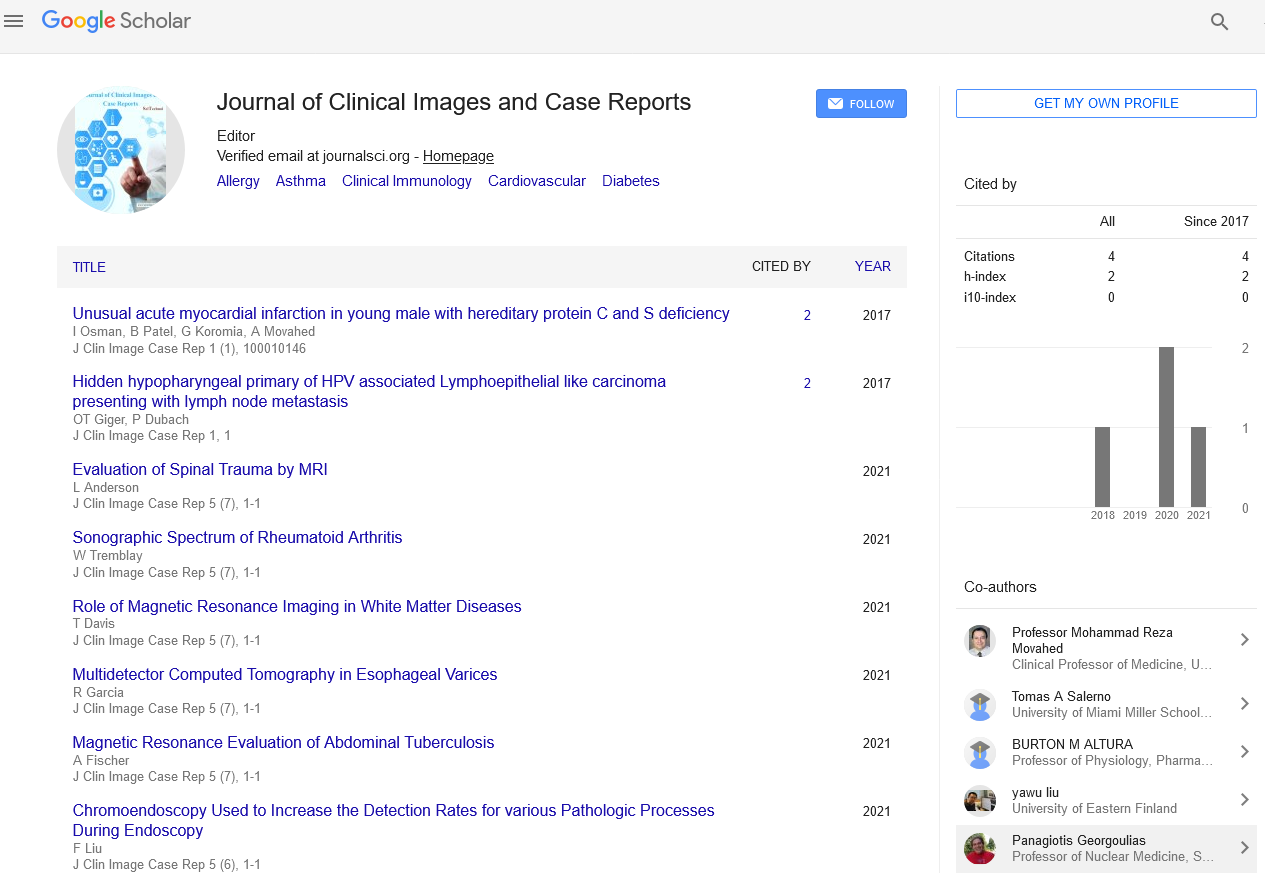Perspective, J Clin Image Case Rep Vol: 8 Issue: 4
Hormonal Regulation in Human Health and Disease
Marieke Montoya*
1Department of Experimental Psychology, Utrecht University, The Netherlands
*Corresponding Author: Marieke Montoya,
Department of Experimental Psychology,
Utrecht University, The Netherlands
E-mail: montoyamarieke@gmail.com
Received date: 22 July, 2024, Manuscript No. CICR-24-149922;
Editor assigned date: 24 July, 2024, PreQC No. CICR-24-149922 (PQ);
Reviewed date: 07 August, 2024, QC No. CICR-24-149922;
Revised date: 14 August, 2024, Manuscript No. CICR-24-149922 (R);
Published date: 21 August, 2024, DOI: 10.4172/CICR.1000313
Citation: Montoya M (2024) Hormonal Regulation in Human Health and Disease. J Clin Image Case Rep 8:4.
Description
Hormones are essential chemical messengers that play an important role in regulating various physiological processes in the human body. Produced by glands in the endocrine system, hormones control vital functions like growth, metabolism, reproduction, mood and immune response. The delicate balance of hormone production and regulation is different for maintaining homeostasis, or internal stability, in the body. Disruptions in hormonal balance can lead to a wide range of health issues, affecting everything from metabolic health to mental well-being.
The mechanisms of hormonal regulation
Hormonal regulation is a highly intricate process involving feedback loops, receptor binding and cellular responses. The endocrine system includes glands such as the hypothalamus, pituitary, thyroid, adrenal, pancreas and gonads (ovaries and testes), which secrete hormones directly into the bloodstream. These hormones then travel to target organs, where they bind to specific receptors and trigger physiological changes.
The process of hormonal regulation typically follows a feedback mechanism, either negative or positive. Negative feedback loops are the most common, where the output of a hormone inhibits further hormone production. For instance, the hypothalamus and pituitary gland regulate thyroid hormone levels in the blood. When thyroid hormone levels are high, the hypothalamus reduces the release of Thyrotropin-Releasing Hormone (TRH), leading to a decrease in Thyroid-Stimulating Hormone (TSH) from the pituitary gland, ultimately lowering thyroid hormone production. This system ensures that hormone levels remain within an optimal range, preventing over or underproduction.
Positive feedback loops, although less common, amplify hormonal effects. A classic example is the surge of Luteinizing Hormone (LH) during ovulation, where increasing estrogen levels from the ovaries stimulate the release of LH, triggering the release of an egg. This selfreinforcing loop ensures that ovulation occurs at the right time in the menstrual cycle.
In addition to feedback loops, hormones are regulated by circadian rhythms, external stressors and nutrient availability. The adrenal hormone cortisol, for example, follows a diurnal pattern, peaking in the early morning to prepare the body for the day and declining at night to promote rest. The disruption of this hormonal rhythm, as seen in chronic stress or shift work, can contribute to metabolic disorders and impaired immune function.
Hormonal dysregulation and its impact on disease
When hormonal regulation is disrupted, it can lead to various diseases, depending on which hormone is involved and the nature of the imbalance. Endocrine disorders can result from either hypersecretion (excess hormone production) or hyposecretions (insufficient hormone production), each causing distinct health problems.
One of the most well-known examples of hormonal dysregulation is diabetes mellitus, which involves abnormal regulation of insulin, a hormone produced by the pancreas. In type 1 diabetes, the pancreas produces little to no insulin due to autoimmune destruction of insulinproducing cells. In type 2 diabetes, the body becomes resistant to the effects of insulin, resulting in high blood sugar levels. Both forms of diabetes can lead to complications such as heart disease, kidney failure and nerve damage if left untreated.
Thyroid disorders are another example of how hormonal dysregulation impacts health. Hypothyroidism occurs when the thyroid gland does not produce enough thyroid hormone, leading to symptoms like fatigue, weight gain and depression. On the other hand, hyperthyroidism is characterized by excessive thyroid hormone production, causing weight loss, anxiety and rapid heart rate. These conditions can often be managed with medications that either supplement or inhibit hormone production, but long-term dysregulation can result in significant health problems.
Cortisol, the body’s primary stress hormone, also plays a central role in human health. Chronic overproduction of cortisol, as seen in Cushing's syndrome, leads to weight gain, high blood pressure and osteoporosis. Conversely, adrenal insufficiency (Addison’s disease) results in inadequate cortisol production, causing symptoms like fatigue, muscle weakness and low blood pressure. Both conditions require lifelong management to maintain proper hormone levels.
Reproductive health is heavily dependent on proper hormonal regulation. Conditions such as Polycystic Ovary Syndrome (PCOS) and endometriosis are linked to hormonal imbalances in women. In PCOS, elevated levels of androgens (male hormones) can lead to irregular menstrual cycles, infertility and metabolic issues. Endometriosis, characterized by the growth of uterine-like tissue outside the uterus, is influenced by hormonal changes in the menstrual cycle and can result in chronic pain and fertility problems.
Mental health is also closely tied to hormonal regulation. Hormones like serotonin, dopamine and cortisol influence mood, stress responses and emotional regulation. Imbalances in these hormones can contribute to mental health disorders such as depression, anxiety and chronic stress. For example, elevated cortisol levels in response to prolonged stress can lead to anxiety and depressive symptoms, while serotonin dysregulation is often linked to mood disorders.
Hormonal regulation is fundamental to maintaining health and preventing disease. The precise control of hormone levels ensures that physiological processes run smoothly, supporting growth, metabolism, reproduction, and mental well-being. However, when this regulation is disturbed, it can lead to a wide array of disorders, ranging from metabolic and reproductive issues to mental health challenges. Understanding the mechanisms of hormonal regulation and the consequences of its disruption is essential for developing effective treatments and promoting overall health. Advances in endocrine research continue to offer insights into how it can better manage and treat conditions related to hormonal imbalances, improving quality of life for those affected.
 Spanish
Spanish  Chinese
Chinese  Russian
Russian  German
German  French
French  Japanese
Japanese  Portuguese
Portuguese  Hindi
Hindi 